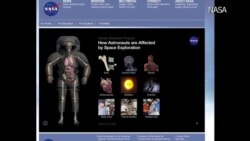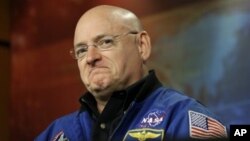U.S. astronaut Scott Kelly is about to embark on his second trip to the International Space Station, a yearlong mission that he said would present a greater challenge than his first visit.
“I think I am going to have to have a whole different pace or perspective on the whole thing this time than I did last time,” he said in a NASA interview.
Kelly’s mental and physical health will be closely monitored during his year in space and after his return. He also is presenting NASA with a unique opportunity, in that researchers will be able to compare medical data taken from his tests and with those from similar tests being performed on his identical twin brother, former astronaut Mark Kelly.
“Mark is volunteering this as a private citizen," said Craig Kundrot, deputy chief scientist of NASA’s Human Research Program at the Johnson Space Center in Houston.
"He is no longer with NASA, but he is volunteering as a research subject for this study. Differences between them are going to be much smaller in a lot of these things we are going to be measuring than if you took two unrelated people, so that allows us, by comparing Scott and Mark, to pick up much more subtle changes,” he said.
One principal focus will be on the bacteria that live in the human digestive system. Kundrot said comparisons could be interesting because the twins will be eating very different food in the year ahead.
“Relative to what Mark will eat on the ground, Scott has a very limited menu of food that he is eating, and it is very sterile,” Kundrot said.
While some Russians have already spent a year in space, NASA scientist John Charles, also with the Human Research Program, notes that was nearly two decades ago, and technology has advanced a lot since then.
“The Russians themselves are very interested in what we are going to learn in this mission, because it is a chance to revisit and further the studies they did earlier,” he said.
Charles said the array of tests and the ability to monitor Scott Kelly’s condition every day could produce unexpected results.
“We are not going to be surprised by surprises," he said. "We were surprised several years ago by finding that certain astronauts have changes in their vision during long-duration space flight about halfway through a six-month mission.”
Another area of interest is the effect of radiation on the human body, something that would be even more intense for astronauts on a three-year mission to Mars.
“That is not really a concern in low-Earth-orbit missions because of Earth’s magnetic field shielding us and shielding them from the effects of deep-space radiation," Charles said, "but we will be monitoring their low-radiation doses and trying to correlate the radiation they do receive with the changes in their psychology, their physiology and their other metabolic status.”
If all goes well, Scott Kelly will begin his yearlong mission March 27.






